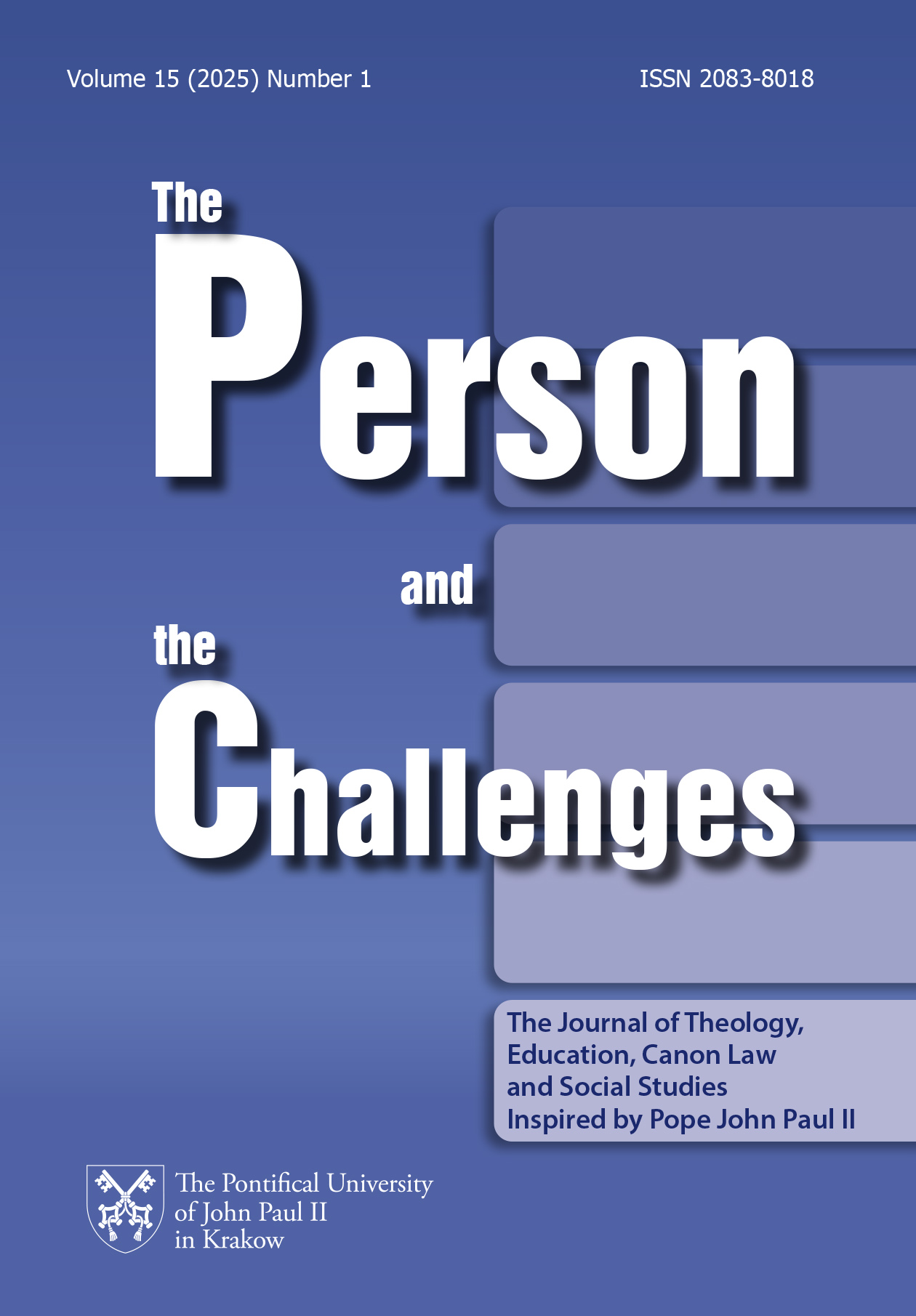Karol Wojtyła as a model of a mature educator in the light of the concept of Zdzisław Chlewiński
DOI:
https://doi.org/10.15633/pch.15111Keywords:
maturity, Karol Wojtyła, personalism, educator, role model, Zdzisław ChlewińskiAbstract
The theme of the paper centres around role models in values education. The purpose of this paper is to answer the following research question: how was the model maturity of Karol Wojtyła as an educator manifested? Reference was made to the concept of mature personality by Zdzisław Chlewiński (1991), who listed three criteria for maturity: personal (personalistic) attitude towards another person, autonomy, and reliable insight into oneself. The results of the analysis showed that Karol Wojtyła’s maturity manifested itself in an exemplary fulfilment of the aforementioned criteria, as demonstrated by examples from his life and teaching. Emphasis was placed on Wojtyła’s authenticity as an educator who not only brought others up to maturity, but was also truly mature himself. Perfect correspondence between his life and teaching was emphasised as well. The author has used Wojtyła’s biographies. Among the numerous studies and source texts on Wojtyła’s life and teaching, those were selected that pertained to the determinants of maturity detailed by Chlewiński. The focus was on the adolescence and early youth of the future Pope John Paul II. Chlewiński’s concept appears as a concise, coherent approach that can be used in subsequent analyses of the life and teaching of truly mature people.
References
Bakiera L., Harwas-Napierała B., Wzory osobowe w rozwoju człowieka, Poznań 2016, Wydawnictwo UAM.
Bilicki T., Dziecko i wychowanie w pedagogii Jana Pawła II, Kraków 2005, Impuls.
Chlewiński Z., Postawy a cechy osobowości, Lublin 1987, Towarzystwo Naukowe KUL.
Chlewiński Z., Dojrzałość. Osobowość, sumienie, religijność, Poznań 1991, Wydawnictwo W drodze.
Francuz P., Ksiądz Profesor Zdzisław Chlewiński, “Roczniki Psychologiczne” 4 (2001), pp. 5–25.
Gorban R., Personalistic View of John Paul II on the Humanizing Function of Art in the Context of Dialogue between the Church and Artists, “The Person and the Challenges” 1 (2022), pp. 53–67, https://doi.org/10.15633/pch.12204.
Jan Paweł II, Autobiografia, Kraków 2002, Wydawnictwo Literackie.
Jan Paweł II, Wstańcie, chodźmy!, Kraków 2004, Wydawnictwo Św. Stanisława.
Jan Paweł II, Pamięć i tożsamość, Kraków 2005, Znak.
Jan Paweł II, Podręcznik pokolenia JP II. Ojcowskie słowo do młodych świata, Polski i Lednicy, Poznań 2008, Duszpasterstwo Akademickie Dominikanów.
Jan Paweł II, Rodzinie zawdzięcza człowiek swe wychowanie. Homilia w czasie mszy św. dla rodzin, Braga, Portugalia, 15.05.1982, in: C. Drążek, J. Kawecki (eds.), Dziecko w nauczaniu Jana Pawła II. Antologia wypowiedzi, Kraków 1985, Wydawnictwo Apostolstwa Modlitwy.
Jan Paweł II, Homilia w czasie mszy św. beatyfikacyjnej o. Rafała Kalinowskiego i Brata Alberta – Adama Chmielowskiego odprawionej na Błoniach, Kraków, 22.06.1983, in: Jan Paweł II (ed.), Pielgrzymki do Ojczyzny, Kraków 1999, Znak.
Jan Paweł II, List “Juvenum patris” do księdza Egidio Vigano, Przełożonego Generalnego Towarzystwa św. Franciszka Salezego, w setną rocznicę śmierci św. Jana Bosko, in: C. Bissoli (ed.), Jan Paweł II o systemie wychowawczym księdza Bosko, Warszawa 2001, Wydawnictwo Salezjańskie.
Jan Paweł II. Prawdziwy wychowawca rozumie młodych ludzi. Spotkanie z młodzieżą szkolną na Placu Maryi Wspomożycielki w Turynie, Turyn, 13.04.1980, in: A. Dymer (ed.), Szkoła katolicka w nauczaniu Kościoła. Wybór dokumentów, Szczecin – Warszawa 2002, Centrum Edukacyjne Archidiecezji Szczecińsko-Kamieńskiej.
Jaworski J., Podstawy patriotyzmu Jana Pawła II, Lublin 2012, Norbertinum.
Juroszek W., Generał Fieldorf ‘Nil’ as a personal model in upbringing towards maturity, “Kwartalnik Naukowy Fides et Ratio” 4 (2022), pp. 43–53, https://doi.org/10.34766/fetr.v4i52.1104.
Juroszek W., Generał August Emil Fieldorf “Nil” jako wzór osoby dojrzałej w świetle koncepcji Zdzisława Chlewińskiego. Ujęcie psychopedagogiczne, Kraków 2023, Impuls.
Juroszek W., Kozubek M., Self-education into maturity in light of the theoretical approach of Zdzisław Chlewiński, “Journal of Vasyl Stefanyk Precarpathian National University” 3 (2023), pp. 247–257, https://doi.org/10.15330/jpnu.10.3.247-257.
Kozubek M., Wartość wychowawcza światowych dni młodzieży z Janem Pawłem II, in: M. Kozubek (ed.), Starość – nie radość? Aktywność osób starszych i solidarność międzypokoleniowa, Katowice 2013, Księgarnia Św. Jacka, pp. 112–122.
Okoń W., Słownik pedagogiczny, Warszawa 2007, Wydawnictwo Akademickie Żak.
Osewska E., Stala J., Bochenek K., The relationship between religion and national culture in Poland in light of John Paul II’s philosophical and theological reflecions, “Religions” 1 (2022), pp. 1–13, https://doi.org/10.3390/rel13010033
Ossowska M., Wzór demokraty. Cnoty i wartości, Lublin 1992, Wydawnictwo Daimonion.
Weigel G., Świadek nadziei, transl. by D. Chylińska, J. Illg, J. Piątkowska, R. Śmietana, M. Tarnowska, Kraków 2012, Znak.
Wolanin A., Wdzięczność w psychologii – przegląd definicji, głównych ujęć i koncepcji, “Polskie Forum Psychologiczne” 3 (2019), pp. 356–372 https://doi.org/10.14656/PFP20190306.
Downloads
Published
Issue
Section
License
Copyright (c) 2025 Weronika Juroszek

This work is licensed under a Creative Commons Attribution 4.0 International License.
Authors who publish with this journal agree to the following terms:
- Authors retain the copyright and full publishing rights without restrictions, and grant the journal right of first publication with the work simultaneously licensed under a Creative Commons Attribution 4.0 International License that allows others to share the work with an acknowledgement of the work's authorship and initial publication in this journal.
- Authors are able to enter into separate, additional contractual arrangements for the non-exclusive distribution of the journal's published version of the work (e.g., post it to an institutional repository or publish it in a book), with an acknowledgement of its initial publication in this journal.
- Authors are permitted and encouraged to post their work online (e.g., in institutional repositories or on their website) prior to and during the submission process, as it can lead to productive exchanges, as well as earlier and greater citation of published work (See The Effect of Open Access).

